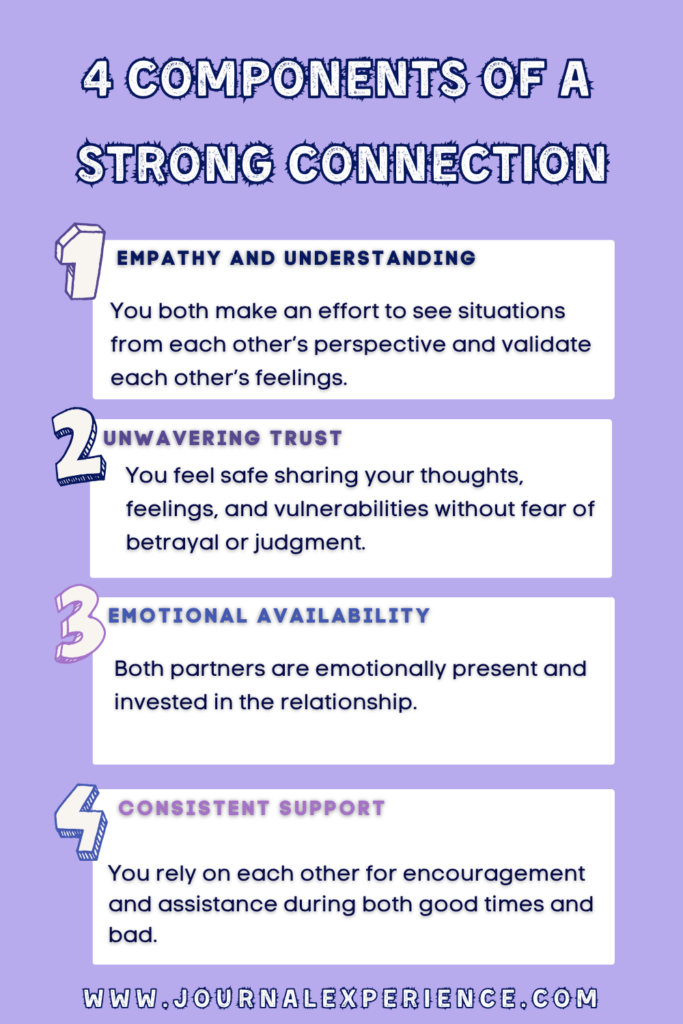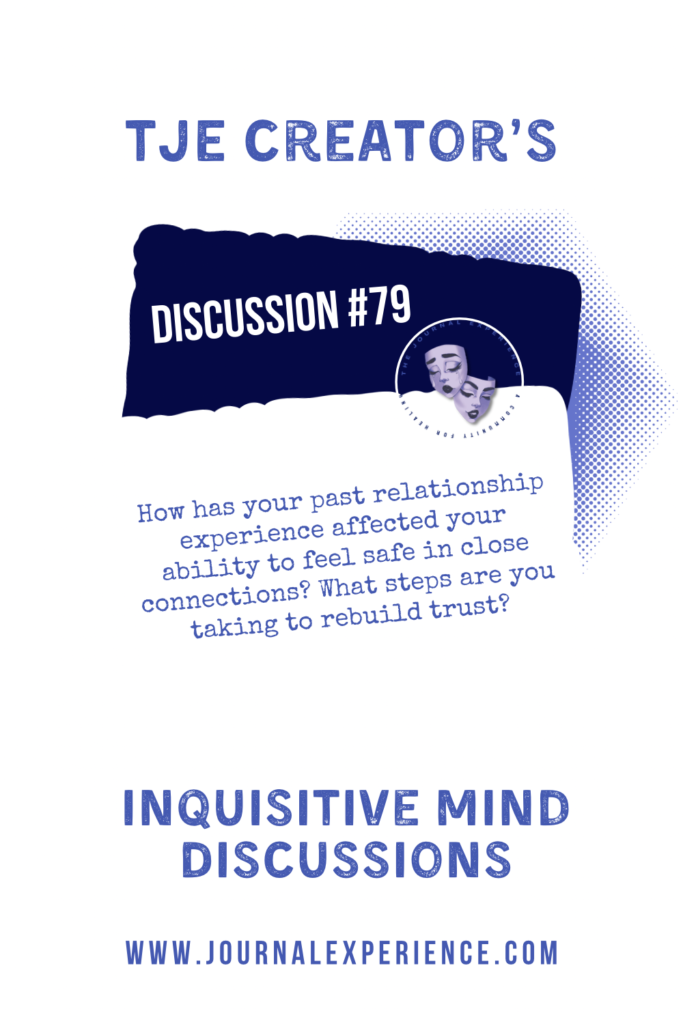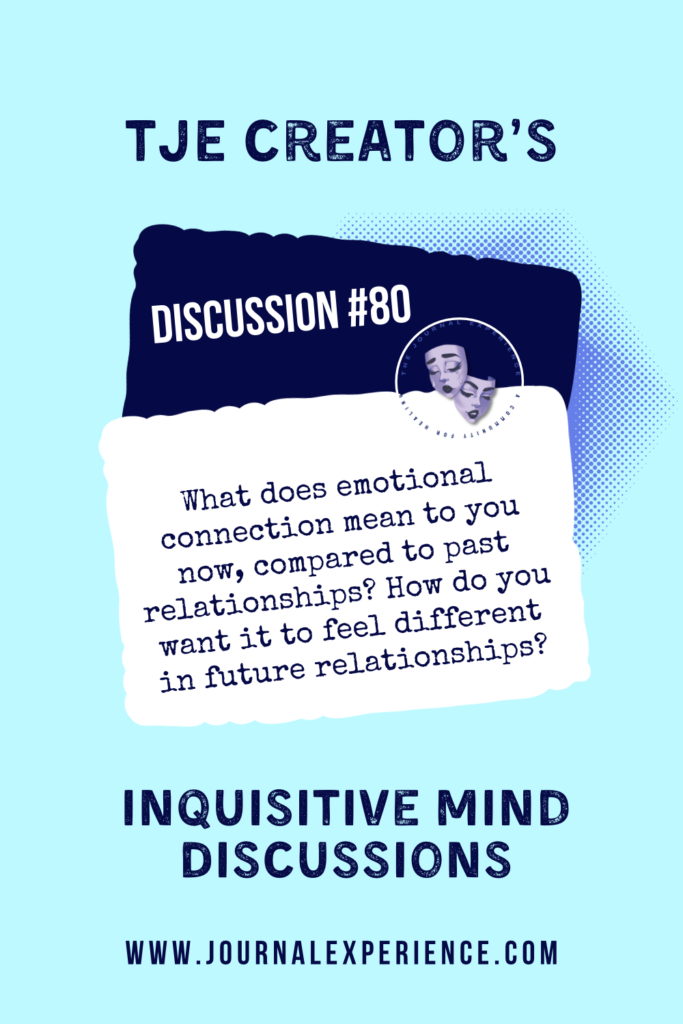Did you know that couples who feel emotionally connected report 20% higher satisfaction in their relationships?

Connection isn’t just a luxury—it’s a necessity. A strong emotional connection in relationships is the foundation of trust, intimacy, and mutual understanding. It serves as the glue that binds partners together, even in challenging times, and fosters long-lasting fulfillment. But what does connection in relationships actually mean, and how can we nurture it in a way that leads to stronger, more meaningful bonds?
In this post, we’ll explore the meaning of connection, why it matters, and the practical steps you can take to deepen it. If you’re looking for gentle guidance to enhance emotional intimacy or repair emotional distance, you’ll also find trusted tools from the Center for Thriving Relationships to support you along the way.
Understanding Connection in Relationships
At its core, connection in relationships refers to the emotional and psychological bond between two people. It’s about feeling understood, valued, and safe in each other’s presence. While physical attraction and shared interests may bring people together, emotional connection is what keeps the relationship thriving over time.
Why Is Emotional Connection So Important?
An emotional connection lays the groundwork for trust, communication, and intimacy. When both partners feel connected, they are better equipped to navigate conflicts, celebrate successes, and support each other during difficult times. Without this bond, relationships can feel hollow, leaving one or both partners feeling lonely or disconnected.
The Components of a Strong Connection
- Vulnerability: The ability to share your fears, dreams, and insecurities without fear of judgment.
- Empathy: Understanding and validating each other’s feelings.
- Mutual Respect: Valuing each other’s individuality and boundaries.
- Shared Goals: Working toward common aspirations, whether personal, financial, or emotional.
When these components are present, the connection between partners can flourish, leading to a healthier and more satisfying relationship.
Ready to create a relationship rooted in safety, trust, and emotional intimacy?
The Thrive in Love Online Course provides a comprehensive path for couples to reconnect and deepen their bond through communication, shared vision, and loving presence.

How to Strengthen Emotional Bonds
Strengthening emotional connection doesn’t happen overnight—it’s a continuous process that requires effort from both partners. Below are actionable techniques to nurture a deeper bond:
1. Practice Open and Honest Communication
Communication is the lifeline of any relationship. Open and honest dialogue allows partners to express their feelings, needs, and concerns without fear of criticism.
- Active Listening: Give your partner your undivided attention. Listen to understand, not to respond.
- Use “I” Statements: Frame your feelings in a way that avoids blame. For example, say, “I feel hurt when…” instead of “You always…”
2. Create Rituals of Connection
Daily or weekly rituals can help strengthen your bond. These don’t have to be elaborate—simple gestures like having coffee together every morning or scheduling a weekly date night can make a big difference.
3. Engage in Shared Experiences
Spending quality time doing activities you both enjoy fosters a sense of togetherness. Whether it’s hiking, cooking, or trying out a new hobby, these experiences help you create lasting memories.
4. Show Appreciation Regularly
Take time to express gratitude for your partner’s efforts, no matter how small. A simple “thank you” or a heartfelt compliment can go a long way in reinforcing your emotional bond.
Signs of a Strong Connection
How do you know if your relationship has a solid emotional connection? Here are some key indicators:
Empathy and Understanding
You both make an effort to see situations from each other’s perspective and validate each other’s feelings.
Unwavering Trust
You feel safe sharing your thoughts, feelings, and vulnerabilities without fear of betrayal or judgment.
Emotional Availability
Both partners are emotionally present and invested in the relationship.
Consistent Support
You rely on each other for encouragement and assistance during both good times and bad.
Healthy Conflict Resolution
Disagreements are inevitable, but how you handle them matters. A strong connection allows for open, respectful discussions rather than arguments that escalate.
Recognizing these signs can provide reassurance about your relationship’s health and highlight areas that may need improvement.
Want help restoring these qualities in your partnership?
The 3 Day Thriving Relationship Workshop offers couples interactive coaching and transformational practices to rebuild connection, trust, and closeness—in just one weekend.
Steps to Deepen Your Connection Over Time
Once you’ve identified ways to improve emotional connection, the next step is to build and maintain it over time. Here are practical strategies to help you:
1. Prioritize Emotional Intimacy
Emotional intimacy is built through vulnerability and trust. Share your thoughts, fears, and aspirations with your partner. Ask open-ended questions to learn more about their inner world.
2. Focus on Physical Affection
Physical touch is a powerful way to strengthen your bond. Simple gestures like holding hands, hugging, or cuddling can reinforce your connection and communicate love without words.
3. Resolve Conflicts Constructively
Conflict can either drive a wedge between partners or bring them closer together. Practice patience and understanding during disagreements, and focus on finding solutions rather than assigning blame.
Need guidance handling recurring tension or disconnection?
Explore the FREE Masterclass (EVERGREEN version) to learn simple yet powerful tools for healing rifts and growing your bond with intention.
4. Keep the Spark Alive
Over time, the excitement of a relationship can fade. To keep the spark alive:
- Surprise your partner with thoughtful gestures.
- Explore new activities or places together.
- Reminisce about happy moments from your past.
5. Seek Professional Help if Needed
Sometimes, strengthening a relationship requires outside support. Couples therapy or relationship coaching can provide tools and strategies to improve connection and resolve deeper issues.
Prefer immersive, in-person support?
Attend the Thrive in Love Weekend Couples Retreat (in person) and rediscover emotional safety, laughter, and love through expert-guided transformation.

Overcoming Challenges to Connection
No relationship is without its challenges, and maintaining emotional connection requires intentional effort, especially when faced with common obstacles. Recognizing and addressing these challenges head-on can pave the way for a stronger, more resilient bond.
1. Busy Schedules
Modern life often leaves little room for deep, meaningful connection. Between work commitments, household responsibilities, and social obligations, it can feel like there’s no time left to nurture your relationship. However, prioritizing your partner—even in small ways—can make a significant difference.
- Plan Regular Check-Ins: Dedicate time each day to reconnect, even if it’s just a 10-minute conversation. Ask each other about your day and share your thoughts and feelings.
- Schedule Quality Time: Set aside a specific time weekly for a date night or shared activity that allows you to focus solely on each other.
- Simplify Your Calendar: Take a close look at your schedules and consider what commitments can be adjusted or removed to make more room for your relationship.
Consistency is key here. Even brief, intentional interactions can help build a sense of togetherness amidst a hectic lifestyle.
2. Communication Barriers
Misunderstandings, unspoken expectations, and differing communication styles are common barriers to connection. When these issues go unresolved, they can create emotional distance. Fortunately, with conscious effort, you can bridge the gap:
- Understand Each Other’s Communication Style: Some people are more expressive, while others may be reserved. Learning how your partner prefers to communicate can help reduce misunderstandings.
- Be Patient and Present: Avoid distractions during conversations and show that you value your partner’s perspective. Practicing patience, especially in emotionally charged discussions, can prevent escalation.
- Address Issues Promptly: Don’t let resentment build. If something bothers you, discuss it constructively before it becomes a bigger problem.
Clear and open communication lays the groundwork for deeper emotional connection. When both partners feel heard and understood, the relationship thrives.
3. Past Trauma or Emotional Wounds
Unresolved trauma, whether from childhood or previous relationships, can act as a barrier to intimacy and trust. These wounds often manifest as fear of vulnerability, difficulty trusting others, or emotional withdrawal. However, healing is possible with the right approach:
- Acknowledge the Impact: Recognize how past experiences may be influencing your current relationship. Self-awareness is the first step toward healing.
- Seek Professional Support: Therapy—whether individual or as a couple—can provide tools to process trauma, rebuild trust, and develop healthier relationship patterns.
- Practice Patience and Empathy: Healing takes time, and both partners must approach the process with understanding. Offering consistent support and creating a safe emotional space can help the partner experiencing trauma open up gradually.
Remember, addressing emotional wounds is not about fixing your partner or yourself; it’s about growing together and fostering a supportive environment where healing can occur.
Want to grow stronger together while honoring emotional healing?
The Thrive in Love Online Course offers a compassionate framework for working through emotional barriers and deepening closeness, even when trauma is part of your story.
4. Differences in Emotional Needs
Every individual has unique emotional needs, and partners may not always be on the same page when it comes to expressing or receiving love. These differences can lead to feelings of being misunderstood or undervalued.
- Identify Your Love Languages: The concept of love languages—such as words of affirmation, acts of service, quality time, gifts, and physical touch—can help you understand how you and your partner prefer to give and receive love.
- Communicate Your Needs: Be open about what makes you feel loved and ask your partner to do the same.
- Find a Balance: Compromise is essential. Make an effort to meet each other’s emotional needs in ways that feel genuine and achievable.
Being attuned to each other’s emotional preferences can greatly enhance the connection and prevent misunderstandings.
5. External Stressors
Life events such as financial difficulties, health issues, or family conflicts can place immense strain on a relationship. These stressors can lead to frustration, resentment, or emotional withdrawal. To combat this:
- Work as a Team: Approach challenges together rather than seeing them as individual burdens. Discuss potential solutions and support each other in implementing them.
- Prioritize Self-Care: Managing external stressors starts with taking care of yourself. When both partners are physically and emotionally well, they are better equipped to handle challenges as a team.
- Celebrate Small Wins: Acknowledge progress, no matter how small. Celebrating achievements, even during tough times, reinforces the connection and reminds you of the strength of your partnership.
6. Emotional Drift Over Time
Over time, couples may find that they’ve drifted apart emotionally. This can happen gradually as routines become monotonous or when partners stop investing energy into the relationship. To reignite the spark:
- Reconnect Through Shared Memories: Reflect on happy moments from the past and recreate activities you both enjoyed.
- Explore New Experiences Together: Trying something new, like taking a class, traveling, or exploring a hobby, can bring fresh energy to the relationship.
- Be Intentional About Affection: Small gestures, like leaving a love note or offering an unexpected hug, can help restore emotional closeness.
Rebuilding connection takes time, but even small steps can yield meaningful results.

Overview
Connection is the cornerstone of lasting, fulfilling love. Through vulnerability, empathy, and presence, couples can create a space that feels safe, intimate, and alive.
If you’re seeking deeper emotional intimacy, consider leaning into the support and guidance offered by the Center for Thriving Relationships—with trusted programs to help you reconnect with your partner and yourself.
Ready to deepen your relationships and strengthen your emotional bonds? Join The Journal Experience community today for access to guided journals, workbooks, and forums designed to help you navigate and enhance your connections. Don’t wait—subscribe to the TJE Newsletter now and become part of an inspiring journey toward stronger, healthier relationships. Join the experience today!